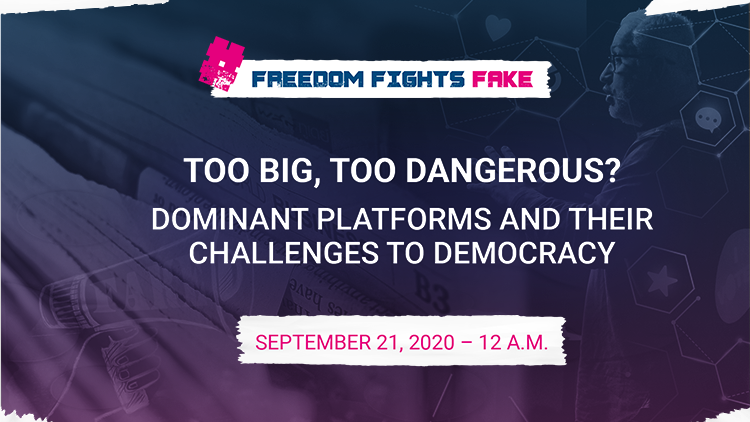#FreedomFightsFake
Too big, too dangerous?

In more and more countries, especially in developing countries, social media platforms are seen as the Internet. They are essential for communication of each kind, organising, and informing the public. But the power of these platforms is enormous, especially regarding what is allowed to be published and what is not. Twitter flags Tweets of Donald Trump as disinformation, Facebook lets a genocide in Myanmar happen, and YouTube deletes the war crimes documentation of Syrian activists. But even in everyday communication, the community standards of social media platforms are setting partially boundaries to the freedom of expression.
On our panel discussion, we talked about dominant platforms and their challenges to democracy. Are they too big and therefore too dangerous? Our panelists, Fanny Hidvegi (Access Now), Nikhil Pahwa (MediaNama), and Sabine Frank (YouTube), agreed that regulating these platforms is crucial. But it is also crucial that legislators ensure human rights, such as freedom of expression, through precise regulations. For example, legislation often refers to so called “harmful content” which platforms are obliged to remove or delete. However, “harmful content” is not a legal term, and it can be misused by autocratic regimes to ban voices of the political opposition, LGBTQI activists or advocates of women’s rights.
The COVID pandemic poses serious challenges to human rights in the digital domain. Our guest Fanny Hidvegi does not believe that the pandemic offers an opportunity to address problems in the digital sphere, such as platforms finally realising that disinformation is a serious problem that needs to be addressed more comprehensively. Instead, the pandemic is causing even more serious problems in the digital domain. Sabine Frank told us how YouTube reacted to the pandemic by adjusting its community guidelines, deleting enormous amounts of health disinformation in this process. Nikhil Pahwa introduced us to India, Facebook’s biggest market, and the specific challenges the platform has caused here.
